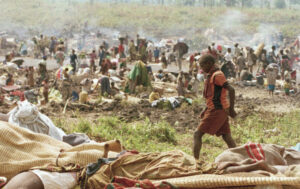
WAKE FOREST, N.C. (BP)–No human experience can help us understand how Christ felt as He prepared to bear humanity’s sin on the cross, C.J. Mahaney told participants at Southeastern Baptist Theological Seminary’s 20/20 Collegiate Conference Feb. 1.
The conference, an annual event geared toward college students and young adults, was held under the theme of “Missio Dei,” a Latin phrase that means “the mission of God.” Mahaney, longtime pastor of Covenant Life Church in Gaithersburg, Md., and leader of Sovereign Grace Ministries, opened the two-day conference.
Focusing on Jesus’ experience in the Garden of Gethsemane recorded in Mark 14, Mahaney explored what it meant for Christ to take away and bear the sins of humanity.
In the Garden of Gethsemane, the Savior’s humanity was uniquely on display, a depiction “foreign” to other portrayals of Jesus in the Gospels as “confident, fearless and bold,” Mahaney said. “In the Garden of Gethsemane, everything is different. Here, we discover what it meant to Him, the Holy One, to bear away our sin.”
In the garden, Christ experienced relational abandonment as well as deep distress of the soul, Mahaney said.
“The Savior was abandoned and alone. Mark wants us to be aware of this,” Mahaney explained. “In verse 27, the Savior informs the disciples, ‘You will all fall away.’ This is what it meant to Him: Relational abandonment.”
No one has ever really been alone like Christ was that evening, Mahaney noted.
“I’ve felt alone, but I’ve never really been alone,” he said. “The Savior was really alone. … The disciples all fell away, all fell asleep. He would walk this road alone.”
Mahaney said he wondered why, as the time for Jesus’ crucifixion grew nearer, He became more deeply distressed than He ever had before.
“Here’s why: In this garden, in a unique way, the Savior begins to get a foretaste of what it meant to be a sin-bearer,” Mahaney said. “He contemplates the cup — the cup of sin and God’s wrath.”
Coming face to face with the reality of becoming the object of God’s righteous wrath “was so horrific to the righteous Savior that He prays … for an alternative,” Mahaney said. “If there was any alternative, the Father would have intervened…. The Son of God was used to hearing God speak to Him. In this moment, in this garden, as He appeals to God for an alternative, this is what He hears — silence.”
Mahaney said he struggled to find a suitable illustration to help the collegians understand what Jesus experienced in the garden that night, only to conclude there is no illustration.
“There is nothing I can say. Only He has been there. Only He understands this. Only one has experienced this distress of soul,” Mahaney said. “This is what my sin required. My sin necessitated the garden. Here, in this garden, we should be amazed by grace.”
By taking mankind’s sin on Himself, Jesus was saying, “This is the cup you should drink: The cup of God’s righteous wrath. I will drink it for you,” Mahaney said. “Here’s the other cup, the cup I want you to have. It’s the cup of my salvation. Here, you drink the one you don’t deserve.”
–30–
Lauren Crane is a writer for Southeastern Baptist Theological Seminary.














